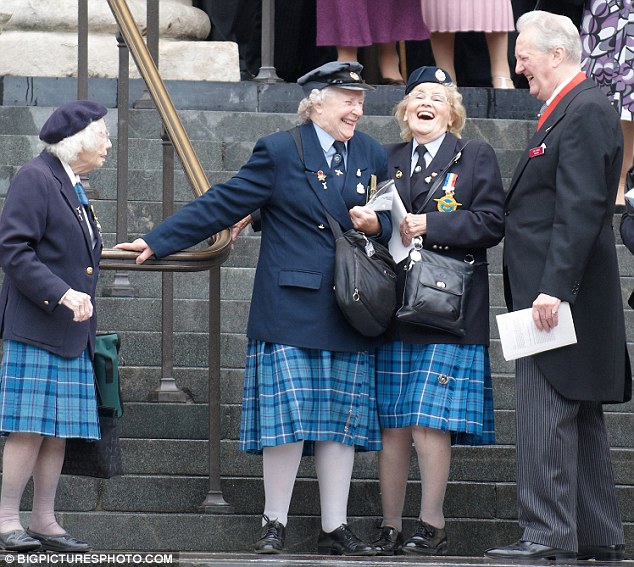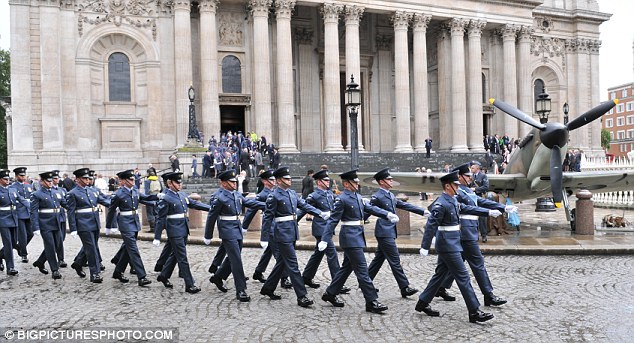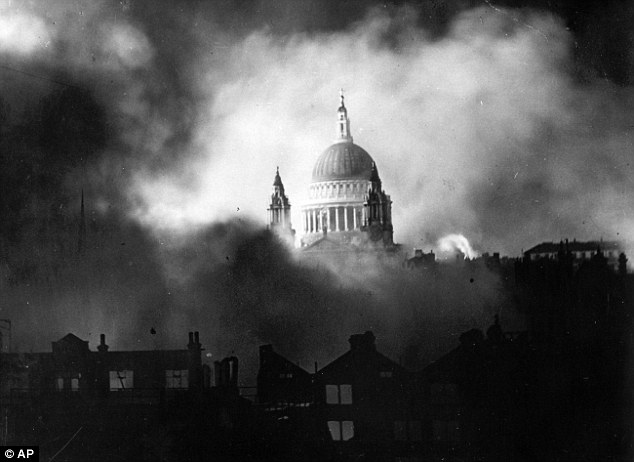Yesterday, 70 years on to the day since the start of the Blitz, RAF veterans who bravely sacrificed their lives during the Blitz to repel Hitler's airforce gathered at St Paul's Cathedral in central London to commemorate the anniversary.
Joining them at the ceremony were firefighters, nurses and ambulance workers who put aside their own safety to save those in need as London, and other British cities, burned.
Also in attendance were those who were young children during the eight month long bombing campaign, who huddled terrified in their shelters listening to the thuds as the German bomb exploded outside.
The Blitz started on 7th September 1940 when hundreds of German bombers appeared in the sky over London like a huge swarm of bees. It must have been a terrifying sight as they approached.
On just the first night alone of the bombing of London 1,000 planes pummelled the city in a bombardent that killed 436 civilians in just eight hours.
5,300 tons of explosives were dropped on London in September alone, and there were to be another 7 months of bombings of that city and many other around the nation.
Other cities, such as Aberdeen, Barrow-in-Furness, Belfast, Bootle, Birkenhead, Wallasey, Birmingham, Bristol, Cardiff, Clydebank, Coventry, Exeter, Glasgow, Greenock, Sheffield, Swansea, Liverpool , Hull, Manchester, Portsmouth, Plymouth, Nottingham, Brighton, Eastbourne, Sunderland and Southampton, also suffered heavy air raids and high numbers of casualties.
The most heavily bombed city after London was Hull with 85% of its buildings being destroyed or affected.
And whilst all this was going on, Britain was the only country taking on Nazi Germany.
Hitler thought the British would soon submit and surrender, yet he was very wrong.
St Paul's Cathedral was the perfect setting to host the 70th anniversary commemorations as the 300 year old building became a symbol of British defiance during the Blitz. As the area all around it burned during what has become known as the Second Great Fire of London, St Paul's Cathedral miraculously remained almost untouched.
The reason for that is that Churchill thought the morale of the British people would quickly drop if they saw that cathedral burning, so he ordered men to protect it at all costs.
One of those at yesterday's ceremony was 86-year-old Richard Holsgrove.
As a 17-year-old fireman during the Luftwaffe's assault, he was tasked with carrying out Churchill's order to 'protect the cathedral at all costs'.
When neighbouring buildings were alight, he doused the cathedral's walls to keep them cool.
Yesterday, the grandfather joked: 'It's a wonderful building. I look at that and think, "You are only there because of me".
Amongst the dignitaries attending the service was the Duke of Kent and the Lord Mayor of London, Nick Anstee. The Duke took the salute as WWII veterans, current servicemen and women and cadets marched past.
A Spitfire stood at the bottom of the cathedral steps and a flypast was performed by a Spitfire, a Lancaster and a Dakota.
Now THAT'S the spirit: 70 years on, veterans of the Blitz gather to remember start of their darkest hour
By Sam Greenhill
8th September 2010
Daily Mail
They had gathered to remember some of the darkest moments in Britain's history.
And 70 years to the day since the start of the Blitz, the veterans showed the same spirit of unity that saw the country through.
Chatting and joking - but also often moved to tears - they arrived at St Paul's Cathedral today to commemorate the ordeal.

Marking the moment: A plane flies over St Paul's Cathedral in central London today during a remembrance service to mark the 70th anniversary of the beginning of the Blitz
For many of the veterans, now in their twilight years, it will be the last time they come together to remember.
Back then, they were the dashing RAF heroes who took to the skies to repel Hitler's bombers, and the firefighters, nurses and ambulance workers who put aside their own safety to save those in need.
Others were simply the innocent boys and girls who huddled, terrified, in the shelters as their mothers tried to soothe their fears.
Yesterday, many wept quietly as the piercing wail of an air-raid siren sounded to mark the start of a minute's silence.
It was about teatime on September 7, 1940, that the first Luftwaffe bombers loomed over London, signalling the start of Hitler's murderous assault.

Fly-by: Onlookers packed the streets around St Paul's to watch a Lancaster (left) and a Spitfire pass overhead
Enlarge
Debt of gratitude: Today's service remembered all those who contributed during the Battle of Britain and was attended by military personnel including former pilots, firemen, nurses and ambulance workers
Enlarge
Re-enactment: A Spitfire sits outside St Paul's as people dressed in World War II era clothing in tribute to those who sacrificed so much for Britain's freedom
Nearly 1,000 German planes pummelled the capital that night in an eight-hour bombardment that claimed more than 400 lives and maimed hundreds of men, women and children.
That month alone, more than 5,300 tons of high explosive were dropped on Londoners - and the peril was to last nearly eight months.
Yet Hitler reckoned without the resilience and fortitude of the British people, and yesterday more than 2,500 of them packed into St Paul's to rekindle the Blitz spirit.
The cathedral, of course, had stood steadfast in the onslaught, its famous dome wreathed in the smoke of the burning City of London.
Its miraculous escape from harm was heralded by Churchill himself, and so it was a fitting venue yesterday as survivors of the bombardment gathered to commemorate the ordeal.
The Dean of St Paul's, the Right Reverend Graeme Knowles, told them: 'As we stand in this building, which itself stood as a national icon of defiance and hope amidst conflict and uncertainty, we pray for all those who hold memories of a campaign which protected this island from invasion.'
One of those at yesterday's ceremony was 86-year-old Richard Holsgrove.
As a 17-year-old fireman during the Luftwaffe's assault, he was tasked with carrying out Churchill's order to 'protect the cathedral at all costs'.
Enlarge
Together again: Former RAF personnel were among those who took part in the service of remembrance
When neighbouring buildings were alight, he doused the cathedral's walls to keep them cool.
Yesterday, the grandfather joked: 'It's a wonderful building. I look at that and think, "You are only there because of me".
'It was as if there was a hand held over it and someone was saying, "We don't mind what you do around it but you're not touching this". It was simply amazing.'
Mr Holsgrove, of Thundersley, Essex, added: 'People used to say you must have been scared but it was more excitement to me. I wasn't scared at all, being that age.'
He went on: 'We must not forget the people that died and those that were heroes in their own right that were helping to save the city.'

Memory lane: Some veterans of the Blitz share a laugh following the service
Enlarge
The Duke of Kent and the Lord Mayor of London, Nick Anstee, were among the dignitaries at the remembrance event.
The Duke took the royal salute outside the cathedral as air cadets and current servicemen and women joined veterans for a parade.
Onlookers packed the streets, and office workers crowded by windows, to watch the procession which was followed by a flypast of Dakota, Spitfire and Lancaster aircraft.
A Spitfire also stood at the bottom of the cathedral steps.
London Mayor Boris Johnson was not able to attend, but said: 'We must never forget the bravery of the men and women who lived through the terrifying and unremitting bombardment which sought to destroy our great cities during the Blitz.'
The RAF's principal chaplain, the Venerable Ray Pentland, said in yesterday's sermon that everyone who played a role in the Battle of Britain, from the pilots to those who provided refreshments, was part of the story which changed the course of history.
'Without the Battle of Britain there would have been no D-Day, no victory in Europe,' he said.
Meanwhile, Dean Knowles praised the gathering for making the 'supreme effort' to attend the service despite a London Underground strike that crippled the capital yesterday.
He later read the now famous words uttered by Churchill: 'The gratitude of every home in our island, in our empire, and indeed throughout the world, except in the abodes of the guilty, goes out to the British airmen who, undaunted by odds, unwearied in their constant challenge and mortal danger, are turning the tide of the world war by their prowess and by their devotion.
'Never in the field of human conflict was so much owed by so many to so few.'
Enlarge
Defiant: St Paul's stands out of the flames and smoke of surrounding buildings during heavy attacks of the German Luftwaffe in December 1940
Enlarge
Recently unearthed: Rare colour footage taken from the top of St Paul's shows the full extent of the damage to buildings surrounding the cathedral during the Blitz (above and below)
Enlarge
dailymail.co.uk
Joining them at the ceremony were firefighters, nurses and ambulance workers who put aside their own safety to save those in need as London, and other British cities, burned.
Also in attendance were those who were young children during the eight month long bombing campaign, who huddled terrified in their shelters listening to the thuds as the German bomb exploded outside.
The Blitz started on 7th September 1940 when hundreds of German bombers appeared in the sky over London like a huge swarm of bees. It must have been a terrifying sight as they approached.
On just the first night alone of the bombing of London 1,000 planes pummelled the city in a bombardent that killed 436 civilians in just eight hours.
5,300 tons of explosives were dropped on London in September alone, and there were to be another 7 months of bombings of that city and many other around the nation.
Other cities, such as Aberdeen, Barrow-in-Furness, Belfast, Bootle, Birkenhead, Wallasey, Birmingham, Bristol, Cardiff, Clydebank, Coventry, Exeter, Glasgow, Greenock, Sheffield, Swansea, Liverpool , Hull, Manchester, Portsmouth, Plymouth, Nottingham, Brighton, Eastbourne, Sunderland and Southampton, also suffered heavy air raids and high numbers of casualties.
The most heavily bombed city after London was Hull with 85% of its buildings being destroyed or affected.
And whilst all this was going on, Britain was the only country taking on Nazi Germany.
Hitler thought the British would soon submit and surrender, yet he was very wrong.
St Paul's Cathedral was the perfect setting to host the 70th anniversary commemorations as the 300 year old building became a symbol of British defiance during the Blitz. As the area all around it burned during what has become known as the Second Great Fire of London, St Paul's Cathedral miraculously remained almost untouched.
The reason for that is that Churchill thought the morale of the British people would quickly drop if they saw that cathedral burning, so he ordered men to protect it at all costs.
One of those at yesterday's ceremony was 86-year-old Richard Holsgrove.
As a 17-year-old fireman during the Luftwaffe's assault, he was tasked with carrying out Churchill's order to 'protect the cathedral at all costs'.
When neighbouring buildings were alight, he doused the cathedral's walls to keep them cool.
Yesterday, the grandfather joked: 'It's a wonderful building. I look at that and think, "You are only there because of me".
Amongst the dignitaries attending the service was the Duke of Kent and the Lord Mayor of London, Nick Anstee. The Duke took the salute as WWII veterans, current servicemen and women and cadets marched past.
A Spitfire stood at the bottom of the cathedral steps and a flypast was performed by a Spitfire, a Lancaster and a Dakota.
Now THAT'S the spirit: 70 years on, veterans of the Blitz gather to remember start of their darkest hour
By Sam Greenhill
8th September 2010
Daily Mail
They had gathered to remember some of the darkest moments in Britain's history.
And 70 years to the day since the start of the Blitz, the veterans showed the same spirit of unity that saw the country through.
Chatting and joking - but also often moved to tears - they arrived at St Paul's Cathedral today to commemorate the ordeal.

Marking the moment: A plane flies over St Paul's Cathedral in central London today during a remembrance service to mark the 70th anniversary of the beginning of the Blitz
For many of the veterans, now in their twilight years, it will be the last time they come together to remember.
Back then, they were the dashing RAF heroes who took to the skies to repel Hitler's bombers, and the firefighters, nurses and ambulance workers who put aside their own safety to save those in need.
Others were simply the innocent boys and girls who huddled, terrified, in the shelters as their mothers tried to soothe their fears.
Yesterday, many wept quietly as the piercing wail of an air-raid siren sounded to mark the start of a minute's silence.
It was about teatime on September 7, 1940, that the first Luftwaffe bombers loomed over London, signalling the start of Hitler's murderous assault.

Fly-by: Onlookers packed the streets around St Paul's to watch a Lancaster (left) and a Spitfire pass overhead
Enlarge

Debt of gratitude: Today's service remembered all those who contributed during the Battle of Britain and was attended by military personnel including former pilots, firemen, nurses and ambulance workers
Enlarge

Re-enactment: A Spitfire sits outside St Paul's as people dressed in World War II era clothing in tribute to those who sacrificed so much for Britain's freedom
Nearly 1,000 German planes pummelled the capital that night in an eight-hour bombardment that claimed more than 400 lives and maimed hundreds of men, women and children.
That month alone, more than 5,300 tons of high explosive were dropped on Londoners - and the peril was to last nearly eight months.
Yet Hitler reckoned without the resilience and fortitude of the British people, and yesterday more than 2,500 of them packed into St Paul's to rekindle the Blitz spirit.
The cathedral, of course, had stood steadfast in the onslaught, its famous dome wreathed in the smoke of the burning City of London.
Its miraculous escape from harm was heralded by Churchill himself, and so it was a fitting venue yesterday as survivors of the bombardment gathered to commemorate the ordeal.
The Dean of St Paul's, the Right Reverend Graeme Knowles, told them: 'As we stand in this building, which itself stood as a national icon of defiance and hope amidst conflict and uncertainty, we pray for all those who hold memories of a campaign which protected this island from invasion.'
One of those at yesterday's ceremony was 86-year-old Richard Holsgrove.
As a 17-year-old fireman during the Luftwaffe's assault, he was tasked with carrying out Churchill's order to 'protect the cathedral at all costs'.
Enlarge

Together again: Former RAF personnel were among those who took part in the service of remembrance
When neighbouring buildings were alight, he doused the cathedral's walls to keep them cool.
Yesterday, the grandfather joked: 'It's a wonderful building. I look at that and think, "You are only there because of me".
'It was as if there was a hand held over it and someone was saying, "We don't mind what you do around it but you're not touching this". It was simply amazing.'
Mr Holsgrove, of Thundersley, Essex, added: 'People used to say you must have been scared but it was more excitement to me. I wasn't scared at all, being that age.'
He went on: 'We must not forget the people that died and those that were heroes in their own right that were helping to save the city.'

Memory lane: Some veterans of the Blitz share a laugh following the service
Enlarge

The Duke of Kent and the Lord Mayor of London, Nick Anstee, were among the dignitaries at the remembrance event.
The Duke took the royal salute outside the cathedral as air cadets and current servicemen and women joined veterans for a parade.
Onlookers packed the streets, and office workers crowded by windows, to watch the procession which was followed by a flypast of Dakota, Spitfire and Lancaster aircraft.
A Spitfire also stood at the bottom of the cathedral steps.
London Mayor Boris Johnson was not able to attend, but said: 'We must never forget the bravery of the men and women who lived through the terrifying and unremitting bombardment which sought to destroy our great cities during the Blitz.'
The RAF's principal chaplain, the Venerable Ray Pentland, said in yesterday's sermon that everyone who played a role in the Battle of Britain, from the pilots to those who provided refreshments, was part of the story which changed the course of history.
'Without the Battle of Britain there would have been no D-Day, no victory in Europe,' he said.
Meanwhile, Dean Knowles praised the gathering for making the 'supreme effort' to attend the service despite a London Underground strike that crippled the capital yesterday.
He later read the now famous words uttered by Churchill: 'The gratitude of every home in our island, in our empire, and indeed throughout the world, except in the abodes of the guilty, goes out to the British airmen who, undaunted by odds, unwearied in their constant challenge and mortal danger, are turning the tide of the world war by their prowess and by their devotion.
'Never in the field of human conflict was so much owed by so many to so few.'
Enlarge

Defiant: St Paul's stands out of the flames and smoke of surrounding buildings during heavy attacks of the German Luftwaffe in December 1940
Enlarge

Recently unearthed: Rare colour footage taken from the top of St Paul's shows the full extent of the damage to buildings surrounding the cathedral during the Blitz (above and below)
Enlarge

dailymail.co.uk